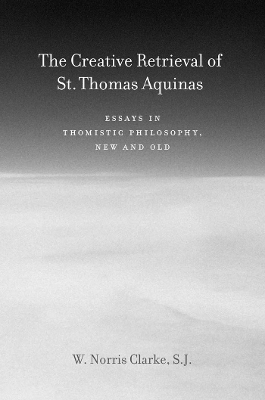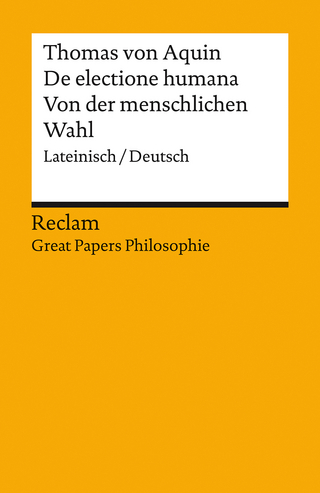
The Creative Retrieval of Saint Thomas Aquinas
Essays in Thomistic Philosophy, New and Old
Seiten
2009
Fordham University Press (Verlag)
978-0-8232-2928-4 (ISBN)
Fordham University Press (Verlag)
978-0-8232-2928-4 (ISBN)
The author is known for his development of a Thomistic personalism. To be a person, according to Saint Thomas, is to take conscious self-possession of one's own being, to be master of oneself. But our incarnate mode of being human involves living in a body whose life unfolds across time, and is inevitably dispersed across time.
W. Norris Clarke has chosen the fifteen essays in this collection, five of which appear here for the first time, as the most significant of the more than seventy he has written over the course of a long career.
Clarke is known for his development of a Thomistic personalism. To be a person, according to Saint Thomas, is to take conscious self-possession of one's own being, to be master of oneself. But our incarnate mode of being human involves living in a body whose life unfolds across time, and is inevitably dispersed across time. If we wish to know fully who we are, we need to assimilate and integrate this dispersal, so that our lives become a coherent story. In addition to the existentialist thought of Etienne Gilson and others, Clarke draws on the Neoplatonic dimension of participation. Existence as act and participation have been the central pillars of his metaphysical thought, especially in its unique manifestation in the human person.
The essays collected here cover a wide range of philosophical, ethical, religious, and aesthetic topics. Through them sounds a very personal voice, one that has inspired generations of students and scholars.
W. Norris Clarke has chosen the fifteen essays in this collection, five of which appear here for the first time, as the most significant of the more than seventy he has written over the course of a long career.
Clarke is known for his development of a Thomistic personalism. To be a person, according to Saint Thomas, is to take conscious self-possession of one's own being, to be master of oneself. But our incarnate mode of being human involves living in a body whose life unfolds across time, and is inevitably dispersed across time. If we wish to know fully who we are, we need to assimilate and integrate this dispersal, so that our lives become a coherent story. In addition to the existentialist thought of Etienne Gilson and others, Clarke draws on the Neoplatonic dimension of participation. Existence as act and participation have been the central pillars of his metaphysical thought, especially in its unique manifestation in the human person.
The essays collected here cover a wide range of philosophical, ethical, religious, and aesthetic topics. Through them sounds a very personal voice, one that has inspired generations of students and scholars.
W. Norris Clarke, S. J., has for decades taught philosophy at Fordham. Among his books are Explorations in Metaphysics: Being-God-Person, The One and the Many: A Contemporary Thomistic Metaphysics, and The Philosophical Approach to God: A New Thomistic Perspective, 2nd Edition (Fordham).
| Erscheint lt. Verlag | 4.3.2009 |
|---|---|
| Verlagsort | New York |
| Sprache | englisch |
| Maße | 152 x 229 mm |
| Themenwelt | Geisteswissenschaften ► Philosophie ► Philosophie des Mittelalters |
| ISBN-10 | 0-8232-2928-9 / 0823229289 |
| ISBN-13 | 978-0-8232-2928-4 / 9780823229284 |
| Zustand | Neuware |
| Haben Sie eine Frage zum Produkt? |
Mehr entdecken
aus dem Bereich
aus dem Bereich
Buch | Softcover (2024)
Reclam (Verlag)
CHF 11,90
Redewendungen aus der Natur
Buch | Hardcover (2024)
Regionalia Verlag
CHF 11,10
von der menschlichen Wahl
Buch | Softcover (2024)
Phillip Reclam (Verlag)
CHF 10,35


